
Journal of Pipeline Science and Engineering
Scope & Guideline
Transforming Ideas into Solutions for Pipeline Challenges
Introduction
Aims and Scopes
- Pipeline Integrity and Safety Management:
Research dedicated to assessing and ensuring the integrity of pipelines, including methodologies for risk assessment, predictive maintenance, and safety protocols. - Fluid Dynamics and Flow Behavior:
Studies focused on the mechanics of fluid flow within pipelines, including numerical simulations, experimental analyses, and modeling of flow characteristics under various conditions. - Corrosion and Material Science:
Investigation into corrosion mechanisms, material degradation, and protective technologies for pipelines, particularly in harsh environments. - Innovative Technologies and Smart Solutions:
Exploration of advanced technologies such as machine learning, artificial intelligence, and sensor networks for monitoring, predicting, and enhancing pipeline operations. - Environmental Impact and Sustainability:
Research addressing the environmental aspects of pipeline operations, including leakage detection, mitigation strategies, and the use of alternative energy sources such as hydrogen.
Trending and Emerging
- Hydrogen Integration in Pipeline Systems:
Recent studies are increasingly focusing on the implications of blending hydrogen with natural gas in existing pipelines, addressing integrity and operational challenges associated with this transition. - Machine Learning and Data Analytics Applications:
The application of machine learning techniques for predictive maintenance, risk assessment, and operational optimization is trending, showcasing the industry's embrace of advanced analytics. - Corrosion Management and Mitigation Strategies:
A growing emphasis on innovative corrosion protection mechanisms and real-time monitoring systems reflects an urgent need to enhance pipeline longevity and safety. - Environmental and Sustainability Considerations:
Research is increasingly directed towards understanding the environmental impacts of pipeline operations and developing sustainable practices, such as efficient leak detection and remediation technologies. - Advanced Simulation Techniques:
There is a rising trend in the use of computational fluid dynamics and other advanced simulation methodologies to predict and analyze pipeline behavior under various operational scenarios.
Declining or Waning
- Traditional Leak Detection Methods:
As newer technologies such as real-time sensor data analysis and machine learning applications gain traction, traditional leak detection methods are being overshadowed, leading to a reduced focus on older methodologies. - Basic Material Testing Techniques:
There is a notable decline in research centered on basic mechanical testing methods for pipeline materials, likely due to a shift towards more sophisticated and predictive modeling approaches. - General Pipeline Design Guidelines:
The journal has seen less emphasis on broad design guidelines as more specific and advanced modeling techniques become the focus of research, indicating a move towards specialized studies.
Similar Journals
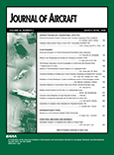
JOURNAL OF AIRCRAFT
Transforming Ideas into Aeronautical Advancements.JOURNAL OF AIRCRAFT, published by the American Institute of Aeronautics and Astronautics, stands at the forefront of aerospace engineering research, serving as a critical resource for researchers, professionals, and students in the field. With a proud publication history dating back to 1964 and continuing through 2024, the journal has established itself as a leading forum for innovative studies and advancements in aircraft design, technology, and utilization. Notably, it holds a prestigious Q1 ranking in Aerospace Engineering and is positioned at the 75th percentile among its peers. As a non-open access publication, it offers a subscription-based model, ensuring high-quality content disseminated to a discerning audience. The ISSN 0021-8669 and E-ISSN 1533-3868 provide easy reference for those seeking to engage with pioneering research in aviation and aircraft systems. Researchers and practitioners alike will find valuable insights and comprehensive analyses in this esteemed journal that continually shapes the development of the aerospace industry.

Frontiers in Mechanical Engineering-Switzerland
Driving Breakthroughs in Engineering ScienceFrontiers in Mechanical Engineering-Switzerland, published by FRONTIERS MEDIA SA, is a pioneering open-access journal that has been fostering innovations in the field of mechanical engineering since its inception in 2015. Based in Switzerland, this journal provides a robust platform for disseminating cutting-edge research across multiple disciplines within mechanical engineering, including materials science, industrial and manufacturing engineering, and computer science applications. With impressive Scopus rankings, including Q2 statuses in key categories such as Industrial and Manufacturing Engineering and Mechanical Engineering, it stands out as a valuable resource for researchers and practitioners aiming to stay abreast of trends and breakthroughs in these fields. By embracing open-access principles, the journal ensures that high-quality research is readily available to a global audience, thereby promoting collaboration and knowledge sharing. As it continues to grow, Frontiers in Mechanical Engineering is poised to make significant contributions to both academic and professional communities, enhancing understanding and advancing practices in engineering disciplines.
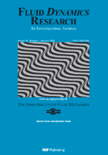
FLUID DYNAMICS RESEARCH
Unveiling the Complexities of Fluid BehaviorFLUID DYNAMICS RESEARCH, published by IOP Publishing Ltd, is a pivotal journal dedicated to advancing the understanding of fluid dynamics through interdisciplinary research that spans several domains including mechanical engineering and physics. With an ISSN of 0169-5983 and E-ISSN 1873-7005, this journal provides a vital platform for researchers aiming to disseminate new findings and theoretical advancements in fluid flow and transfer processes. As of 2023, FLUID DYNAMICS RESEARCH holds a commendable position within the academic community, ranked Q3 in fluid flow and transfer processes, mechanical engineering, and miscellaneous physics and astronomy categories. The journal showcases a diverse array of articles that not only inspire collaboration among professionals and students but also ensure that theoretical and experimental studies are accessible for further development in the field. Operating from the United Kingdom, the journal offers a unique opportunity for scholars worldwide to contribute to the vibrant community dedicated to understanding the complexities of fluid dynamics, even as it anticipates converging its years of research from 1986 to 2024.

JOURNAL OF ENGINEERING PHYSICS AND THERMOPHYSICS
Shaping the Future of Thermal Science and EngineeringJOURNAL OF ENGINEERING PHYSICS AND THERMOPHYSICS, published by Springer, is a vital resource for researchers and professionals in the fields of engineering physics and thermophysics. With an ISSN of 1062-0125 and an E-ISSN of 1573-871X, this esteemed journal has been disseminating high-quality research since its inception, covering critical advancements in both condensed matter physics and various engineering disciplines. Despite its classification within the third quartile in both Scopus categories for 2023, the journal remains a significant conduit for innovative studies that push the boundaries of knowledge in thermal and physical engineering, with converged years spanning from 1992 to 1997 and 2004 to 2024. The journal does not offer open access, which means subscribers and institutions have exclusive access to its rich content. As the field continues to evolve, JOURNAL OF ENGINEERING PHYSICS AND THERMOPHYSICS plays an essential role in fostering scholarly discussions and supporting the academic community in tackling contemporary engineering challenges.
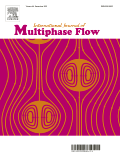
INTERNATIONAL JOURNAL OF MULTIPHASE FLOW
Pioneering Research in Multiphase FlowINTERNATIONAL JOURNAL OF MULTIPHASE FLOW, published by Pergamon-Elsevier Science Ltd, is a premier platform dedicated to the dissemination of cutting-edge research in the field of multiphase flow. With an impressive impact factor and ranking in the Q1 category across various disciplines including Fluid Flow and Transfer Processes, Mechanical Engineering, and Physics and Astronomy, this journal serves as a crucial resource for researchers and professionals aiming to advance knowledge and applications in fluid dynamics. Since its inception in 1973, the journal has established a distinguished legacy, providing a venue for high-quality research articles, comprehensive reviews, and technical notes that push the boundaries of current understanding. Although it does not offer Open Access options, its rigorous peer-review process ensures that only the most relevant and significant contributions are published, making it a vital source for students and experts alike striving for excellence in their fields. The journal is based in Kidlington, Oxford, United Kingdom, and continues to be a pivotal part of scholarly discourse in multiphase flow research.

FDMP-Fluid Dynamics & Materials Processing
Advancing Knowledge in Fluid Dynamics and Materials ProcessingFDMP-Fluid Dynamics & Materials Processing, published by TECH SCIENCE PRESS, stands as a significant contribution to the field of materials science, specifically focusing on the intricate relationships between fluid dynamics and material processing. With an ISSN of 1555-256X and an E-ISSN of 1555-2578, this journal offers an open-access platform where researchers can disseminate their work broadly, promoting collaboration and innovation among professionals and students alike. Established in 2007 and continuously evolving through to 2024, the journal is classified in the Q4 category of materials science, ranking at #347 out of 463 in the Scopus database, signifying its niche yet crucial role in the academic community. By focusing on the dynamic interplay between fluid behavior and material properties, FDMP addresses contemporary challenges and advances in material processing techniques. The journal plays a pivotal role for academics and industry professionals seeking to push the boundaries of knowledge and application in materials science.
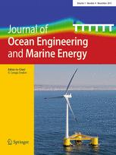
Journal of Ocean Engineering and Marine Energy
Navigating the Future of Renewable Ocean SolutionsJournal of Ocean Engineering and Marine Energy, published by SpringerNature, stands at the forefront of interdisciplinary research within the fields of ocean engineering and marine energy. Since its inception in 2015, this journal has aimed to address critical challenges and innovations in energy systems, particularly those harnessed from marine environments, thereby contributing to sustainable development and efficient resource management. With an esteemed Q2 ranking in multiple categories such as Energy Engineering and Power Technology, and Ocean Engineering, the journal serves as a vital platform for researchers, professionals, and students seeking to disseminate and engage with cutting-edge research and technological advancements. Boasting a robust readership and a commitment to open-access principles, the journal fosters a collaborative environment for the exploration of new ideas and approaches in a rapidly evolving sector. By bridging the gap between academia and industry, Journal of Ocean Engineering and Marine Energy remains instrumental in shaping the future of renewable energy solutions and environmental sustainability.

Interfacial Phenomena and Heat Transfer
Catalyzing Research in Heat Transfer and Interfacial PhenomenaInterfacial Phenomena and Heat Transfer is a leading academic journal published by BEGELL HOUSE INC that has rapidly established itself as an essential resource for scholars and industry experts in the fields of engineering, fluid flow, and chemical processes. With an ISSN of 2169-2785 and E-ISSN 2167-857X, this journal focuses on the critical interdisciplinary aspects of heat transfer and interfacial phenomena, offering insights that span across mechanical engineering, chemical engineering, and physical sciences. Despite its relatively recent inception in 2017, it has garnered respectable recognition, with a 2023 Scopus rank placing it in the Q3 category within the disciplines of Engineering (miscellaneous) and Fluid Flow and Transfer Processes, making it a pertinent publication for those interested in cutting-edge research. As researchers and professionals navigate the complexities of interfacial dynamics, Interfacial Phenomena and Heat Transfer serves as a pivotal platform, publishing high-quality, peer-reviewed articles that aim to advance knowledge and stimulate further investigation in this increasingly vital domain.
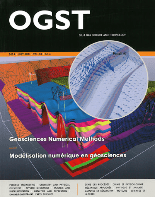
Oil & Gas Science and Technology-Revue d IFP Energies nouvelles
Transforming Knowledge into Energy SolutionsOil & Gas Science and Technology - Revue d'IFP Energies nouvelles, published by EDP SCIENCES S A, is a distinguished journal in the field of energy science, specifically focusing on the latest advancements in oil and gas technologies. Since its transition to Open Access in 1997, the journal has been dedicated to disseminating high-quality research that addresses the challenges and innovations inherent in energy engineering and fuels. With an ISSN of 1294-4475 and an E-ISSN of 1953-8189, this journal holds a significant position in academic circles, reflecting its contributions to sustainable energy solutions. The journal's rankings in Scopus showcase its impact, particularly in the areas of Energy Engineering and Power Technology (Rank #105/224), Chemical Engineering (Rank #131/279), and Fuel Technology (Rank #51/100). As a pivotal resource for researchers, professionals, and students, it aims to foster knowledge exchange and promote innovative technologies essential for the ongoing evolution of the energy sector.
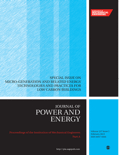
PROCEEDINGS OF THE INSTITUTION OF MECHANICAL ENGINEERS PART A-JOURNAL OF POWER AND ENERGY
Empowering Research for a Sustainable FuturePROCEEDINGS OF THE INSTITUTION OF MECHANICAL ENGINEERS PART A-JOURNAL OF POWER AND ENERGY, published by SAGE PUBLICATIONS LTD, is a pivotal journal dedicated to advancing the fields of mechanical engineering and energy technology. With a history spanning from 1983 to 2024, this journal provides a respected platform for researchers and practitioners to disseminate findings that address contemporary challenges in power generation, energy efficiency, and sustainable engineering practices. As evidenced by its quarter ranking in Q3 within the categories of Energy Engineering and Power Technology, and Mechanical Engineering, it serves as a significant resource for academics aiming to enhance their understanding and explore innovation in these critical areas. While currently not an open-access journal, the research published here is invaluable for both ongoing education and professional practice, making it an essential read for anyone engaged in the engineering disciplines.